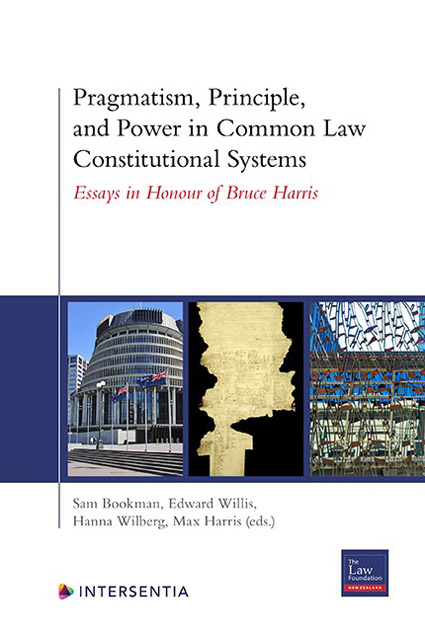 Pragmatism, Principle, and Power in Common Law Constitutional Systems
Pragmatism, Principle, and Power in Common Law Constitutional Systems Book contents
- Frontmatter
- Foreword
- Preface
- Contents
- The Writings of Professor Bruce Harris
- List of Cases
- List of Contributors
- Introduction
- Part I The Nature of Executive Power
- Part II Issues Concerning The Judiciary: The Nature of Judicial (and Executive) Power
- Part III Issues Concerning The Judiciary: Creativity and Pragmatism in Judicial Method
- Part IV Issues Concerning The Judiciary: Judicial Appointment and Accountability
- Part III The Nature of Unwritten Constitutions and Their Future
- Index
Preface
Published online by Cambridge University Press: 19 November 2022
- Frontmatter
- Foreword
- Preface
- Contents
- The Writings of Professor Bruce Harris
- List of Cases
- List of Contributors
- Introduction
- Part I The Nature of Executive Power
- Part II Issues Concerning The Judiciary: The Nature of Judicial (and Executive) Power
- Part III Issues Concerning The Judiciary: Creativity and Pragmatism in Judicial Method
- Part IV Issues Concerning The Judiciary: Judicial Appointment and Accountability
- Part III The Nature of Unwritten Constitutions and Their Future
- Index
Summary
Bruce Harris is a stalwart of the New Zealand legal community and epitomises the very best of legal academia. His dedication to teaching in his 23 years at the University of Auckland, in addition to his previous tenure at the University of Otago, has inspired hundreds of lawyers, especially those who have completed his legendary public law honours seminar. His research has sparked new fields of scholarly inquiry from republicanism to judicial conduct, and his suggestion of the ‘third source of executive power’ has been cited and developed in judicial decisions across the Commonwealth. His administrative service – as dean, university councillor and work with the New Zealand Vice Chancellors’ Committee – has been influential and prolific.
But more than a list of achievements, Bruce's career has been marked by remarkable kindness and dedication to his students and colleagues. Anyone who has met Bruce will know of his extraordinarily calm, patient and inclusive approach. Colleagues at both Auckland and Otago universities credit him with making the faculty lounge a warmer place to be. In emails and in person, he insisted on referring to his undergraduate honours students as his ‘colleagues’. But his calm and cordial manner has never been a barrier to passion when necessary. Bruce was known as a champion of student and staffwelfare in boThthe law school and the university at large and was never afraid to speak out against corporatising governance reforms. In class there were certain topics – the Kerr/Whitlam saga, the Saxmere cases, and Henry VIII clauses – which sparked his righteous indignation. and Bruce's career has also been marked by a quiet but mischievous humour. His public law honours seminars were full of quips and witty critiques, and he encouraged a spirit of jovial camaraderie. WiTha glint in his eye and deadpan demeanour, he was known for bringing a box of fried chicken to class to illustrate aspects of contract law, or an antique model of the Queen to explain his theory of the third source. He seems to take joy in eliciting surprised reactions to the unexpected.
Bruce's academic work is impressive in both substance and depth. But the breadth and method of his scholarship is equally impressive. Bruce sees public law as a system and avoids the tendency to think too narrowly in terms of administrative law, human rights, or Te Tiriti o Waitangi: for Bruce, no subfield can make sense detached from another.
- Type
- Chapter
- Information
- Pragmatism, Principle, and Power in Common Law Constitutional SystemsEssays in Honour of Bruce Harris, pp. ix - xiiPublisher: IntersentiaPrint publication year: 2022


